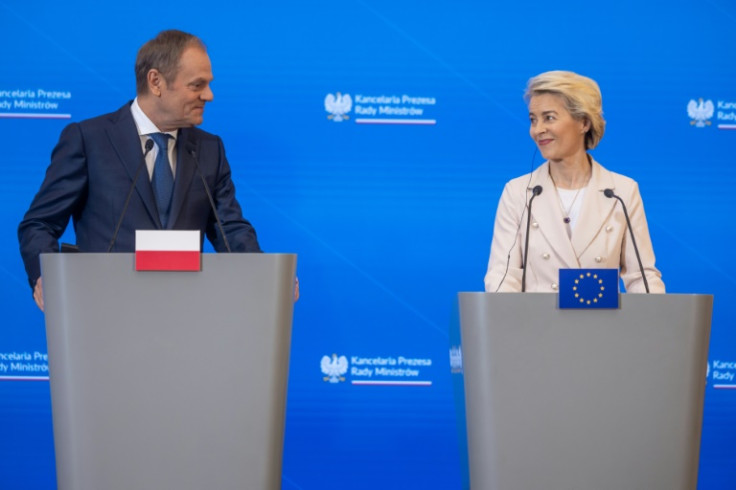
The EU said Monday it will drop action started against Poland six years ago over rule-of-law concerns that could have led Warsaw to lose its vote in the bloc's affairs.
The European Commission said it intends to withdraw the procedure launched in December 2017 under Article 7 of the Treaty on European Union after Warsaw's new centrist government took steps to remedy the issues.
Commission chief Ursula von der Leyen hailed the "new chapter for Poland" in a posting on X, formerly Twitter.
"After more than six years, we believe that the Article 7 procedure can be closed. I congratulate (Polish) PM Donald Tusk and his government on this important breakthrough," she said.
The Article 7 procedure was started because of controversial moves by Poland's previous right-wing government, including creating a special disciplinary chamber with power over the country's judges and a ruling claiming that EU law ranked lower than Polish national law.
Brussels viewed the moves as democratic backsliding undermining EU standards and threatening rule of law in the bloc.
The commission -- the official "guardian" of the bloc's treaties -- reacted by initiating the Article 7 procedure, which the European Parliament endorsed in 2018.
But late last year a new pro-EU government took power in Poland, under Prime Minister Donald Tusk -- a former president of the European Council which represents the bloc's 27 member countries.
Since Tusk took office, Poland has undertaken reforms of the country's judicial system, re-recognised the primacy of EU law and made other moves to address Brussels' concerns.
As a result, the commission said in a statement Monday, it "considers that there is no longer a clear risk of a serious breach of the rule of law in Poland within the meaning of Article 7.1 of the Treaty on European Union".
It will take its intention to drop the Article 7 procedure to the next meeting of the EU's European Affairs ministers on May 21.
After that consultation, "the commission intends to formally withdraw" its Article 7 action, it said.
Already in February, the commission approved the release of up to 137 billion euros ($148 billion) in frozen EU funds for Poland, noting progress on judicial reforms.
The European Parliament in September 2018 initiated a separate Article 7 procedure against Hungary for restricting independent media, civil society, arts and culture.
That procedure is still in place, though the commission in December unfroze 10 billion euros for Hungary, citing steps to improve the judiciary's independence. Budapest claimed the move was linked to it lifting a veto it had been wielding over EU aid to Ukraine.







